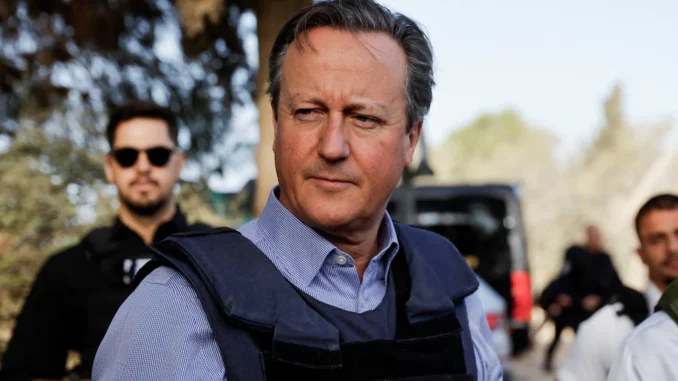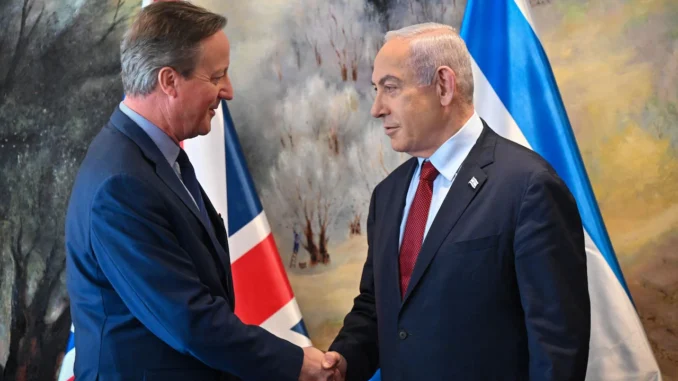E. Rowell: This is one of two articles in the last two days (the most recent by Sue Ellen Braverman) criticizing Lord Cameron and others for their betrayal of Israel and for their irresponsible non-response to the exponentially increasing number of Muslim antisemitic attacks in London and elsewhere in England since 7 October.
Foreign Office criticised for not recognising that ‘Israel has no other option other than to continue the war’
Edward Malnick, TELEGRAPH UK 30 March 2024
 Lord Cameron favours a ‘pause’ in fighting so that Israeli hostages can be released and more aid brought into Gaza CREDIT: ALEXANDER ERMOCHENKO/REUTERS
Lord Cameron favours a ‘pause’ in fighting so that Israeli hostages can be released and more aid brought into Gaza CREDIT: ALEXANDER ERMOCHENKO/REUTERS
Lord Cameron is “losing focus” on the threat posed to Israel by Hamas, a leading KC in the House of Lords has suggested, as he urged the Government to face up to the “political and military reality” in the region.
Lord Pannick, who was part of a parliamentary delegation visiting Israel last week, said he was concerned that recent decisions and statements by the Foreign Office demonstrated a “failure to recognise that Israel really has no other option other than to continue the war against Hamas”.
The peer said of Lord Cameron, the Foreign Secretary: “I hope that he will reconsider a return to an approach that understands the problems that Israel faces and its vital need to do all it can to reduce the military capabilities of Hamas.”
Following previous criticisms of the Foreign Secretary’s public criticisms of Israel, Foreign Office sources insisted that “being a friend means having to deliver a tough message”, including by putting pressure on the Israeli government to facilitate the passage of more humanitarian aid into Gaza.
On March 20, Lord Cameron said that “we’ve got to get Hamas leaders out of Gaza” in order to achieve a permanent ceasefire. He has said that he favours a “pause” in which Israeli hostages would be released and more aid brought into Gaza, before moving to a longer-term ceasefire using the “unstoppable momentum” generated in such a scenario.
But Lord Wolfson of Tredegar, a former Conservative minister and another senior KC in the Lords, said that, while Rishi Sunak had provided “a voice of personal moral clarity” on Israel, “I would like to see that echoed among all officials in King Charles Street [the Westminster address of the Foreign Office] also”.
He questioned why the UK had opened up a division with the US, which abstained on the UN vote, and it was “surprising” that the Foreign Office was threatening a ban on arms sales to Israel given that Britain sells weapons to countries such as Qatar “which are neither democracies nor facing threats of annihilation”.
Earlier, Lord Cameron faced a backlash from Tory MPs over Britain’s support for the UN resolution. Theresa Villiers, the former Northern Ireland secretary, said she was “alarmed” at Britain’s new position and asked if ceasefire calls were still conditional on the release of hostages.

here are concerns the Government’s support for Israel is diminishing CREDIT: GPO/KOBI GIDEON HANDOUT/EPA-EFE/Shutterstock
Before last week’s UN vote, Lord Polak, another Conservative peer, who is honorary president of Conservative Friends of Israel, appeared to warn that parts of the Government were among organisations involved in “the spread of lies about what is happening in Gaza”.
Taking part in a Lords debate on genocide on March 22, Lord Polak said: “Let us look at the harm that misinformation can bring about. Sadly, social media and mainstream news outlets, including elements of the UK Government, could be complicit because of the spread of lies about what is happening in Gaza. I shudder to think what Joseph Goebbels would have done with social media.”
Speaking to The Sunday Telegraph following his return from Israel last week, Lord Pannick said: “There is concern that the Foreign Office, having shown, correctly, great sympathy for Israel after Oct 7 is beginning to lose a proper focus. The main evidence of that is a failure to recognise that Israel really has no other option other than to continue the war against Hamas – emphasising, not a war against the Palestinian people.
“It is pretty clear from Oct 7 and from what Hamas has said since then that if their capability to strike Israel is not removed there will be another Oct 7 … Israel has to stop that and another country in its position would do the same … I and others are very concerned that the Government is losing focus on these central points.”
Lord Pannick told the Lords in October of how the conflict was “personal for me”, given that his wife was Israeli and the couple have friends whose family members were murdered by Hamas terrorists on Oct 7.
He told this newspaper that the “tragic” images of suffering in Gaza hid “a more complicated reality”, adding: “I am concerned that the Government is not focusing on the political and military reality and is looking only at one aspect, tragic though it is.” He continued: “I am absolutely convinced that Israel’s approach to this conflict is in line with international law.”
Lord Wolfson said: “The idea that you have a ceasefire with Hamas and then move to talks which lead to a two-state solution is utter fantasy. Hamas want a one state, theocratic and Jew-free solution. I’ve always been a believer in the two-state solution, which has been UK foreign policy for as long as I can remember.
“What I would hope is that the Foreign Office appreciates that it’s not a case of, either you have the war against Hamas fought until Hamas is defeated, or you have a peace process leading to a two-state solution. A necessary precursor for a two-state solution is for Hamas to be utterly defeated.”
The Telegraph has previously reported that Lord Cameron is ready to suspend the UK’s export licence to Israel if there is a change in his department’s legal advice on whether Israel is complying with international humanitarian law.
On Saturday night the Observer reported claims by Alicia Kearns, the Commons foreign affairs committee chairman, that government lawyers had provided advice that Israel has breached international humanitarian law in Gaza.



@Edgar So what? So what if she was doing what she thought was in Great Britain’s or Europe’s best economic interest? Do we care what’s in Great Britain’s, excuse me, “the U.K.’s” or Europe’s, excuse me, “Eurabia’s” best economic interest when it conflicts with the interests of Israel? I know I don’t. Do you believe she was someone Israel could trust, that she was even one iota different from any of the frenemies Israel has to contend with today, as John suggested? If so, I disagree with you. Why did Rabin even have to talk to her? Maybe he should have lectured her about Northern Ireland while having dinner with IRA leaders. In Northern Ireland. Or “the North of Ireland” as the South Irish and Northern Catholics like to say. Have to say, she was fun to read about. Remember when she threatened to nuke Argentina?
“…The prime minister went to the British Consulate in East Jerusalem to hear eight prominent political figures from the occupied West Bank and Gaza express their views on possible ways out of the present impasse in negotiations.
After several hours of informal talks over dinner they said she had been sympathetic to their complaints about the realities of Israel occupation. They made clear to her that they still consider the PLO as their sole legitimate representative and said they rejected terrorism.
British sources said the meeting had been friendly and constructive. Despite the lack of practical advance Mrs Thatcher apparently feels that she has further bolstered her reputation as an influential leader interested in resolving the Palestinian question.
It was further claimed, with some satisfaction, that the tone of the meeting had demonstrated that British support for the US raid against Libya had not caused the dramatic rift with the Arab world as a whole which some had predicted.
But the general air of satisfaction which followed the meeting did not conceal the considerable difficulties which Mrs Thatcher has found in identifying practical steps forward which are acceptable to the main parties at the heart of the Middle East dispute.
Although she had no specific plan for a peace initiative she was clearly anxious to hear at first-hand how established Palestinian leaders see the way forward. Her anxiety had been intensified by an unproductive meeting with Mr Yitzhah Rabin, the Israeli Defence Minister, whose responsibilities include administration of the occupied territories.
Mr Rabin said that the talks had been cordial but he made no secret of his differences with Mrs Thatcher over the best way of administering the territories. The prime minister said on Sunday that Israel could do more to improve the Palestinians’ standard of living and should show respect for their rights.
Mr Rabin, a former prime minister and a hawkish member of the Labour party, argued that Israel was already doing a great deal. He claimed that Israel’s fight against terrorism would help peace and benefit the Arab population.
He said: “I mentioned that Europe is doing very little on its own in helping to improve the standard of living and the quality of life. I wish that Europe would be more ready to improve the hygienic conditions of the refugee camps and to assist in the welfare of the people who reside in the West Bank and the Gaza Strip.”
From Mrs Thatcher’s point of view, the meeting was unproductive. Her suggestion that elections be held for mayors was firmly rejected on the grounds that such contests did not take place elsewhere in the Arab world.
Mr Rabin said it would be very strange if the first elections in the Arab world were held “under so-called Israeli military occupation.”
Mrs Thatcher has been having a generally successful visit in terms of the warmth of her reception. Her views have been given prominence in local newspapers and on the airwaves, but her efforts to show some progress towards peace have so far had little success…” – ibid
SEBASTIEN
You haven’t taken into account that when Thatcher was PM the whole of Europe depended on Arab oil. Even though they had the Nth. Sea oil it was policy to support their allies….wouldn’t you think???
@John Galt III
The British can’t be trusted since Lord Balfour or maybe Margaret Thatcher. The Brits need oil and Israel doesn’t have it. Nat Gas yes, but no oil to ship to the UK.
Cameron is Tony Blair with a brain of an imbecile. Blair was at least a moron.
This smacks of more meddling by people who seem to have no other hobby. Israel needs to take immediate steps to stop helping countries that keep insisting that since they know best, everyone should fall in line and prepare to die if that is the game of the day.